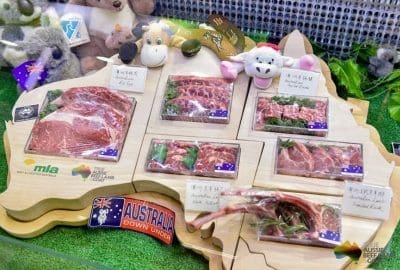EXPECTATIONS about China imported beef demand next year, and the likely performance of beef exports out of the US and Australia were popular topics raised by analysts during JBS’s third quarter financial results briefing held recently.
JBS’s Australian and US operations contrasted sharply in third quarter results posted earlier, partly driven by contrasting livestock purchase price trends on either side of the Pacific (see earlier report).

A display promoting Australian beef and lamb in China.
Global chief executive Gilberto Tomazoni said due to rapid rises in US livestock prices this year due to drought impact, JBS’s US beef division was one of two JBS business divisions that were currently “performing below their potential.”
“In our third quarter (ended 30 September), we continue to work on restoring the profitability of our US operation and we’re beginning to see the initial results,” he told investors.
Commercial and industrial operational changes in the company’s US Beef business were helping JBS navigate the lowest point in the cattle cycle. Margins in the US operations are showing gradual recovery, even in a scenario of tighter spreads and reduced cattle supply,” he said.
JBS long-term vision remained unchanged, Mr Tomazoni said, with the company’s diversified geographic spread across the world helping minimise local challenges, like those being seen in US beef.
Chief financial officer Guilherme Cavalcanti said JBS’s Australian operations despite a decrease for the quarter in consolidated net revenue, grew its third quarter pre-tax earnings margin 3 percentage points to 6.6pc.
“This improvement mainly reflected the lower purchase price of live cattle given the greater availability of animals due to the more favourable price cycle in Australia,” he said. “According to Meat & Livestock Australia, the price of live cattle in Australia fell 49pc year over year in the third quarter.”
JBS US division head Wesley Batista told analysts the company’s US beef business was going to be a challenge, as the industry in North America approached the bottom of the (cattle supply) cycle, due to drought.
“We haven’t reached there yet. When the US industry starts retaining heifers, that’s going to be good news long-term, but short-term pain for US beef packers. When that happens (a start to herd rebuilding) is going to depend on climate and weather.”
“If weather allows, the US beef industry is likely to start retaining heifers next year, which should reduce the availability of fed cattle. So we expect 2024 to be a challenging year for US beef – more challenging than this year,” Mr Batista said.
Bullish over Australian operations
Gilberto Tomazoni said at the same time, JBS was “very bullish” in terms of its Australian operations.
“We are now working one shift (at the company’s largest facility, JBS Dinmore), and are planning for the next year to be working two shifts, because the availability of cattle. The market is demanding, but we are very bullish in terms of our strategy operation in Australia,” he said.
Another analyst asked whether the re-emergence of El Nino was likely to again impact Australian beef’s prospects, given early signs of “some sort of a herd liquidation.”
“Is that what’s been accelerating Australian cattle supply, or the lower cost? Or is it really just because of everything that’s been rebuilt from the last (Australian herd) recovery post-drought situation some years ago that you now just have a healthier availability of cattle?”
Mr Tomazoni said the availability of cattle was because Australia had had two or three years of good seasons, rebuilding its herd.
“Now, the higher availability of cattle has hurt the livestock price, and the availability hurts the cost because its a positive cycle. El Nino could be again be an issue in Australia, but so far, it’s too early to say something about that.”
International demand
A number of analysts asked about JBS’s take on international demand for beef next year, and particularly from China, where slgns of flatter demand and economic slowdown were emerging.
Mr Tomazoni said JBS anticipated China demand to keep growing long-term, because it was structural rather than cyclical demand.
“Looking at the per capita beef consumption in China, it’s still very low compared with other markets with the same income power. That means that red meat is an aspiration in China, and it keeps growing,” Mr Tomazoni said.
“Other proteins are a different dynamic. China will buy (pork and chicken) just of specific cuts, but not structural. In contrast, we see beef demand continuing to grow.
“Certainly, some people are saying the (Chinese) economy is not in the growth cycle it was before – but look, it still grows at 6pc a year and the size of the economy is much bigger than before.”
“We are very positive about China, not just for next year. We are positive for long-term in terms of beef, because that Chinese demand is structural, and keep growing,” he said.
A second analyst asked about current signs of weakening prices and flatter demand for imported beef in China, especially for Brazilian beef.
Mr Tomazoni repeated that JBS remained positive about demand in China, because it was “long-term, structural demand” – especially considering per capita beef consumption in China is very low, at 7.8kg per capita.
“This will be keep growing, it’s not just for next year, but they keep growing for long-term because the economy is keeping on growing,” he said.
“If you look for now, considering the current China price in terms of the cost of the cattle we have in Australia and Brazil, the margin is not too bad. Of course, there is opportunity for growth, given historical prices. But even considering the current price, the margin is not bad. We are positive about China for next year,” he said.
